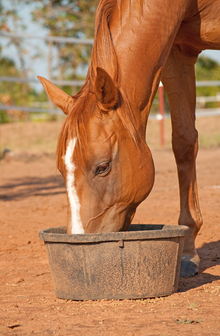In a report, Dr. Lori K. Warren, a Provincial Horse Specialist with the Alberta Agriculture Food and Rural Development Department discusses horse feeding myths and misconceptions debunked through scientific study. One myth that many horse owners believe in is the myth that bran mashes have a laxative effect and are good for preventing colic in horses.

Bran myth busted
Research has shown that bran does not have a laxative effect and studies have found that adding wheat bran to the diet did not soften the stools of horses.
Myth: "Bran mashes have a laxative effect." One of the oldest management practices associated with horses is the weekly feeding of a hot bran mash. While there are numerous recipes for these concoctions, the main ingredient is wheat bran.
When horses were used for farm work, this mash was usually offered on Saturday night, the eve of their one day of rest. Mashes were thought to have a laxative effect that would "clean them out" and help to prevent colic. Although most horses aren't used for farm work today, many still receive this weekly bran mash for the same reasons.
Research has shown that bran does not have a laxative effect. Studies have found that adding wheat bran to the diet did not soften the stools.
In fact, the moisture content of the manure was similar whether the horses received wheat bran or not. Instead, wheat bran increases the bulk of the manure, giving the appearance that the horse is dumping a bigger pile. Many attributed the "laxative" effect to the fibre in wheat bran.
Physicians recommend their patients eat bran cereal or a bran muffin to stay "regular," so wheat bran should work the same for horses, shouldn't it? In truth, wheat bran is not a high fibre feed. Sure, wheat bran has more fibre than corn, but it has about the same amount of fibre as oats and less fibre than hay.
So, why does bran work as a laxative for humans and not horses? To understand, you must consider that the typical equine diet contains more than 35% fibre), whereas the typical human diet contains less than 2% fibre. So, a scoop of wheat bran will hardly make a dent in the high fibre diet of the horse, but a bran muffin will probably contribute a significant amount of fibre to the low-fibre diet of a human.
Although wheat bran is not a laxative, it can be quite tasty and provide energy and protein at levels similar to oats. For these reasons, wheat bran should be thought of as grain, rather than forage.
However, all brans, including wheat and rice bran, are very high in phosphorus with about 90% of the phosphorus in brans in the form of phytate, which decreases calcium absorption, as well as reduces the absorption of copper, zinc and manganese.
If you feed a couple of pounds of bran (wheat or rice) every day, the diet must be balanced with adequate calcium. Horse owners who feed a bran mash once a week may be off the hook for causing mineral imbalances, but may instead be upsetting the microorganisms in the digestive tract.
Most horse owners heed the warning that any changes to the diet should be made gradually to avoid colic. Yet these same horse owners don't see a problem with providing a bran mash once a week. Despite the good intentions, a weekly bran mash is a dramatic feed change and will upset the delicate balance of microorganisms that aid in digestion of the normal hay and grain.
Killing the good bacteria in the gut usually results in diarrhea, which could be another reason why horsemen over the years believed wheat bran acted as a laxative. Should bran mashes be avoided altogether? No, but you may need to rethink why and how often you are feeding them. If you want a laxative, wheat bran is not going to work.
If it gives you a warm-fuzzy feeling to prepare a treat for your horse, go with a bran mash. However, feed it every day to avoid upsetting the digestive tract. And if you are feeding more than a pound of bran per day, make sure you are also balancing the mineral content of the diet to offset the high phosphorus content of the bran either with a mineral supplement or a feed naturally high in calcium, such as alfalfa hay or beet pulp.
